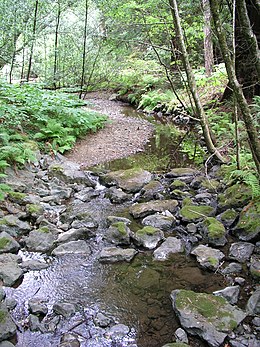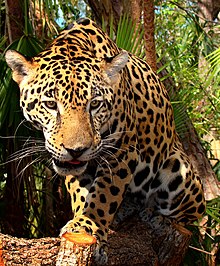
Back بوابة:علم البيئة Arabic Portal:Ecologia Catalan Portal:Økologien Danish Portal:Ecología Spanish درگاه:بومشناسی Persian Portail:Écologie French 포털:생태학 Korean Портал:Екологија Macedonian Portal:Ecologia Portuguese Portal:Ecologie Romanian
| |
|
|
Ecology
|
|
Ecology (from Ancient Greek οἶκος (oîkos) 'house' and -λογία (-logía) 'study of') is the natural science of the relationships among living organisms, including humans, and their physical environment. Ecology considers organisms at the individual, population, community, ecosystem, and biosphere levels. Ecology overlaps with the closely related sciences of biogeography, evolutionary biology, genetics, ethology, and natural history. Ecology is a branch of biology, and is the study of abundance, biomass, and distribution of organisms in the context of the environment. It encompasses life processes, interactions, and adaptations; movement of materials and energy through living communities; successional development of ecosystems; cooperation, competition, and predation within and between species; and patterns of biodiversity and its effect on ecosystem processes. Ecology has practical applications in conservation biology, wetland management, natural resource management (agroecology, agriculture, forestry, agroforestry, fisheries, mining, tourism), urban planning (urban ecology), community health, economics, basic and applied science, and human social interaction (human ecology). The word ecology (German: Ökologie) was coined in 1866 by the German scientist Ernst Haeckel. The science of ecology as we know it today began with a group of American botanists in the 1890s. Evolutionary concepts relating to adaptation and natural selection are cornerstones of modern ecological theory. Ecosystems are dynamically interacting systems of organisms, the communities they make up, and the non-living (abiotic) components of their environment. Ecosystem processes, such as primary production, nutrient cycling, and niche construction, regulate the flux of energy and matter through an environment. Ecosystems have biophysical feedback mechanisms that moderate processes acting on living (biotic) and abiotic components of the planet. Ecosystems sustain life-supporting functions and provide ecosystem services like biomass production (food, fuel, fiber, and medicine), the regulation of climate, global biogeochemical cycles, water filtration, soil formation, erosion control, flood protection, and many other natural features of scientific, historical, economic, or intrinsic value. (Full article...) Selected article - River ecosystems are flowing waters that drain the landscape, and include the biotic (living) interactions amongst plants, animals and micro-organisms, as well as abiotic (nonliving) physical and chemical interactions of its many parts. River ecosystems are part of larger watershed networks or catchments, where smaller headwater streams drain into mid-size streams, which progressively drain into larger river networks. The major zones in river ecosystems are determined by the river bed's gradient or by the velocity of the current. Faster moving turbulent water typically contains greater concentrations of dissolved oxygen, which supports greater biodiversity than the slow-moving water of pools. These distinctions form the basis for the division of rivers into upland and lowland rivers. The food base of streams within riparian forests is mostly derived from the trees, but wider streams and those that lack a canopy derive the majority of their food base from algae. Anadromous fish are also an important source of nutrients. Environmental threats to rivers include loss of water, dams, chemical pollution and introduced species. A dam produces negative effects that continue down the watershed. The most important negative effects are the reduction of spring flooding, which damages wetlands, and the retention of sediment, which leads to the loss of deltaic wetlands. (Full article...)Selected image -Schooling bigeye trevally. In biology, any group of fish that stay together for social reasons are said to be shoaling and if the group is swimming in the same direction in a coordinated manner, they are said to be schooling.
General imagesThe following are images from various ecology-related articles on Wikipedia.
Related WikiProjectsThings you can do
Entries here consist of Good and Featured articles, which meet a core set of high editorial standards.
 A keystone species is a species that has a disproportionately large effect on its natural environment relative to its abundance. The concept was introduced in 1969 by the zoologist Robert T. Paine. Keystone species play a critical role in maintaining the structure of an ecological community, affecting many other organisms in an ecosystem and helping to determine the types and numbers of various other species in the community. Without keystone species, the ecosystem would be dramatically different or cease to exist altogether. Some keystone species, such as the wolf and lion, are also apex predators. The role that a keystone species plays in its ecosystem is analogous to the role of a keystone in an arch. While the keystone is under the least pressure of any of the stones in an arch, the arch still collapses without it. Similarly, an ecosystem may experience a dramatic shift if a keystone species is removed, even though that species was a small part of the ecosystem by measures of biomass or productivity. It became a popular concept in conservation biology, alongside flagship and umbrella species. Although the concept is valued as a descriptor for particularly strong inter-species interactions, and has allowed easier communication between ecologists and conservation policy-makers, it has been criticized for oversimplifying complex ecological systems. (Full article...)Selected biography - Did you know (auto-generated)
Selected quote -
Ecology news
Additional News Highlights
Selected publication -The International Journal of Plant Sciences covers botanical research including genetics and genomics, developmental and cell biology, biochemistry and physiology, morphology and structure, systematics, plant-microbe interactions, paleobotany, evolution, and ecology. The journal also regularly publishes important symposium proceedings. (Full article...) Related portalsMore did you know -Related articlesAssociated WikimediaThe following Wikimedia Foundation sister projects provide more on this subject:
Web resourcesPreview warning: Page using Template:Div col with unknown parameter "1 = 2"; use colwidth= to specify column size
Discover Wikipedia using portals |
© MMXXIII Rich X Search. We shall prevail. All rights reserved. Rich X Search













































